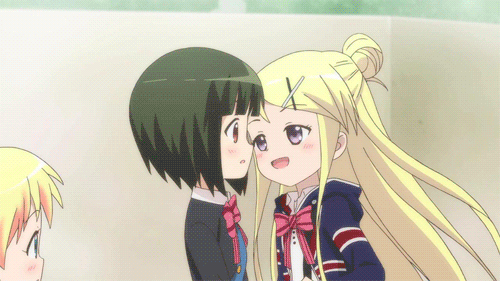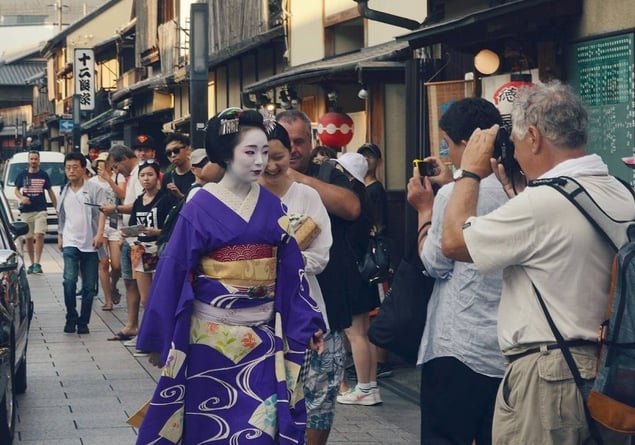Recently, Japan has been blessed with a high number of foreign visitors that have been flocking to Tokyo, Osaka and Kyoto to take in all the wonderful mysteries that the country has to offer. And while this has been an incredibly positive thing both for the foreign visitors to Japan as well as Japan itself, which benefits economically, there are times when gaijin go a little too far. So here’s a post discussing six things foreigners should not do in Japan.

The Boom in Tourism in Japan
Tourism has positively exploded in Japan over the past decade. After dropping to a low of 6 million per year in the aftermath of the 3.11.11 tsunami and Fukushima disaster, it’s shot up at a steady pace, topping 30 million visitors in 2018, a number which will only increase with next year’s 2020 Olympics.
This has changed Japan in some major ways, as pretty much every business has re-aligned itself to be more convenient to foreign visitors, printing up menus in English, Chinese and Korean, adding free WiFi to their establishments and doing other things to help us feel welcome. The visitors come from all over the world, with numbers from China, Taiwan, Vietnam, France, Australia and the USA all rising yearly. (Only numbers from South Korea are falling, due to an unfortunate spat going on between the two countries.)
As a result of the high number of tourists, Japanese have become even warmer and more welcoming to visitors than they already were, always happy to tell us which subway line to take and talk with us if we’re seated beside them in a bar. In my new weekend life in Tokyo, I’ve been enjoying chatting with people from all over the world while I eat and drink, Blade Runner-style.
Six Things Foreigners Should Not Do in Japan
So here’s a list of things to keep in mind when planning your next visit to the land of the rising sun.

First, Enjoy Your Time in Japan Without Worrying Too Much
As a foreign visitor to Japan, you’ve kind of got a special status as an okyakusan (a guest), and as such are excused from not knowing every bit of chopstick etiquette or how many times you’re supposed to ring the bell and clap before praying at a Shinto shrine. So relax and enjoy your time in Japan without stressing out about getting every little thing right.
It’s different for someone like me, a permanent resident. While the Japanese will gladly cut me slack if I make a faux pas in a social situation, I’m expected to follow social rules more than visitors from abroad.

Know What’s Illegal in Japan
Remember that Japan is still a conservative country when it comes to any kind of drugs. Even bringing your ADHD medication can be a problem. Check ahead of time if you have questions.
When in Japan, visit any koban (police box) if you need assistance or have lost a wallet or other items. They may or may not speak a lot of English, but they’ll find a way to be helpful. You can even borrow train fare from a police box (or any train station), if you promise to return the money later.
Try To Avoid Being Overly Loud
Japanese know that foreigner visitors are excited to be in Japan, and they’re forgiving if we get a little loud. But it’s nice when we are aware of what volume level is appropriate for a given room.

Basic Eating/Drinking Manners
I had an interesting experience when I attended my daughter’s high school graduation dinner in Australia, because I was the only American in the room, and thus, the only one without impeccable British table manners. I freaked out, obsessively watching the others around me to figure out how to eat without bringing shame to my country.
While eating in Japan isn’t such a formal affair, there are some basic things to avoid doing. The main points to keep in mind are:
- Don’t stand your chopsticks in rice or hand food from chopstick to chopstick, as this is tied to funerals.
- When drinking with others socially, it’s polite to pour for others and having them pour for you, especially if it’s a senpai or someone of higher rank than you.
- A lot of establishments accept cash only, so check ahead of time.
- The Japanese rarely eat while walking or in public places, although certain foods like ice cream are not a problem.
- A lot of things that would be frowned upon in the West are perfectly okay here, like slurping your noodles or picking up a soup bowl to drink out of it. Note: don’t slurp spaghetti, as it’s a “Western” food and therefore subject to a different set of rules.

Don’t Be a “Maiko Paparazzi”
A newly-coined phrase this year is maiko paparazzi, which describes the tendency of foreigners visiting the Hanami Kouji area of Kyoto (the geisha district) and surrounding the poor maiko girls as they walk to work, photographing them and even rudely touching their kimonos, which are purchased by the girls themselves. To combat the “geisha stalker” problem, photography in the area has been banned, with a fine of 10,000 yen for violations.
Similarly, it’s NG — a word that sprang from the Allied Occupation of Japan meaning “no good” which the Japanese use as the opposite of OK — to photograph maids handing out flyers for maid cafes in Akihabara, or ask cosplayers at Comiket outside of approved areas for a photo.
Writing about the concept of “meiwaku” which means to cause inconvenience to others. Eating a steaming-hot meat bento on a train like this would generally not be done in Japan.
(It is okay to eat on a train with forward-facing seats like a Shinkansen, for some reason.) pic.twitter.com/GyhKCR7poc
— Peter Payne (@JListPeter) December 18, 2019
Understand the “Golden Rule” of Japan
If there’s a single “golden rule” of Japanese society it’s that we should all avoid causing 迷惑 meiwaku, inconvenience or annoyance, to others. If you understand this concept, then you don’t need to know any more about how to get along in Japan. For example, you don’t need to be told that “talking on a cell phone inside a train or bus should be avoided” as this would cause meiwaku to the people around you. Also, don’t eat a steaming hot beef tongue bento on a train, like Nao did in episode 2 of Charlotte.
Bonus: You Might Want to Bring Gifts
Depending on who you’re meeting when you come to Japan, you might want to bring some random gifts from your home country with you. It’s always a good idea when visiting Japan.
Got any other questions about what you should do or see when you come to Japan? Ask us on Twitter!
Our customers are enjoying our EMS Half Price Shipping sale, using it to order great anime figures, anime magazine and artbooks, and naughty products and save on the shipping. But if you’re looking to get your order of awesome products from Japan by Christmas, we’ve got great news: super-fast DHL express shipping, which we’re beta-testing with the U.S. and Canada currently. See more details on our DHL shipping here. The last day to order is December 22, so get your orders in fast!
















